What is this “Messenger Marketing” All About?
In this article, I’m going to share some in-depth details about the Messenger Marketing opportunity.
In case you’re still unsure of what Messenger Marketing is, and how it’s different than email marketing, here’s some more information:
What Can You Do With Messenger Marketing?
The beauty of Messenger Marketing is that you can still do all the stuff you’re used to doing in your marketing efforts…it just makes everything easier and more effective.
When someone sends you a message they’ll be automatically added to your ManyChat subscriber list. From there you can also add them to your email list and continue to follow up with them via email.
You can send them content, sell them products, ask for feedback, and more — all within the native Messenger app.
The ability to add clickable call-to-action buttons in messenger gives you the freedom to customize messenger marketing for any business.
For example, look how easy it is to register someone for a webinar:
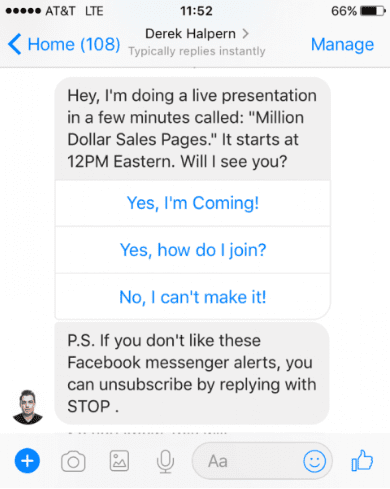
Depending on which link you click, Derek’s chatbot can automatically register you for the webinar, give you the details on how to attend, or offer to send you the recording.
You can also use ManyChat to segment your visitors and find out what their interests are so that you can present them with relevant and personalized product recommendations: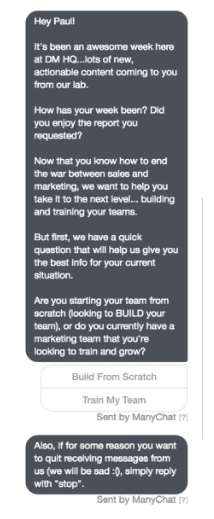
Or, simply use a chatbot to deliver white papers and other lead-nurturing content: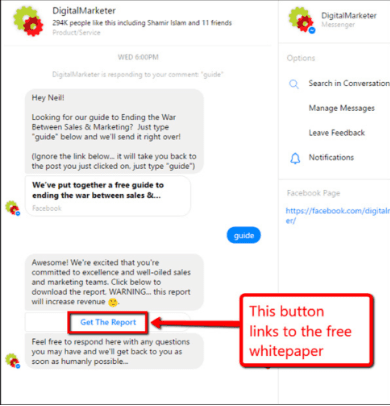
“Cutting-edge e-commerce companies are using messenger marketing to send transactional messages (whether on desktop or mobile) — sending purchase confirmations, letting people know when their product has shipped, and so on.
Look how Code&Quill, a brand that creates specialty notebooks for creatives sends all the information their customers need about their orders: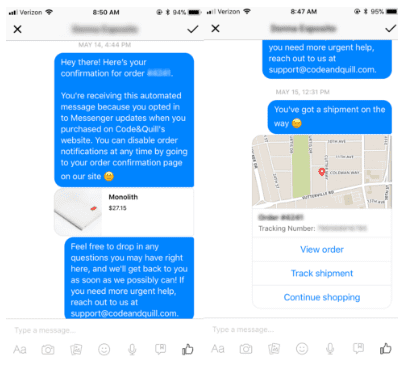
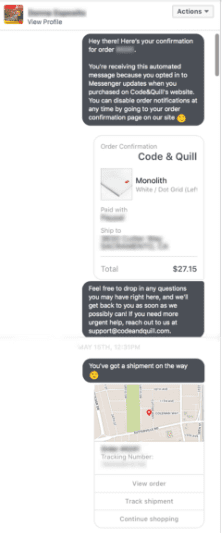
Of course, you’re already able to do all of this through email. But email feels cold and impersonal, and even the best email marketing departments in the world still get open rates under 30%.
In contrast, Facebook messages provide your customers with the personal, one-on-one interactions they want, with open rates currently hovering around 85%. And if they have a question, all they have to do is reply to your message—and someone from your company will be able to respond instantly.
And that’s what’s so great about Facebook Messenger Marketing. It gives you all the automation you could want, but in a way, that’s also private and personal. As a result, it provides less friction for the end user, helping you to develop a deeper relationship with your customers.
It was that goal—less friction for the end user, helping businesses to develop a deeper relationship with their customers—that drove us as we built ManyChat; the platform can already accomplish those things. But in the near future, you’re going to see companies doing even more remarkable things with Messenger Marketing.
The best is yet to come.
And for a glimpse into what the future might hold, let’s take a quick trip across the world—where the future is now for messaging apps.
The Meteoric Rise of Messengers: The China Case Study
I’ve said before that in the next 5-7 years, Messenger Marketing is going to capture 80% of all B2C communication.
It’s going to replace email, websites, phone calls, and SMS as the primary way businesses communicate with customers. It’s not going to be “just another channel.”
It’s going to be THE channel.
And if you’re skeptical about any of this, look no further than China—where this exact thing has already happened.
In China, over 900 million people use WeChat each month, making it the most widely used app in the country. It’s the dominant way people communicate, pushing SMS and email to the sidelines—even at work, where many employees use WeChat for business communications (instead of email). The app allows for free video calls, easy sharing of large files, and instant group chats. Instead of exchanging business cards, you simply use WeChat to scan someone’s QR code and snag their contact information.
It’s done more than that, though.
In many cases, WeChat has actually replaced websites altogether. Many bloggers in China have turned to WeChat as their primary channel for distributing content, generating massive readership without ever even posting to a traditional blog.
Did I mention it’s also a revenue monster—largely replacing cash and credit cards? WeChat Pay is everywhere in China: you can use it to pay for purchases at physical and online stores, request taxis, order movie tickets, and even buy a drink from a vending machine.
According to the 2017 WeChat User Report, 87-94% of users in China pay for offline purchases using WeChat…compared to 38-51% using cash and 29-36% using debit/credit cards: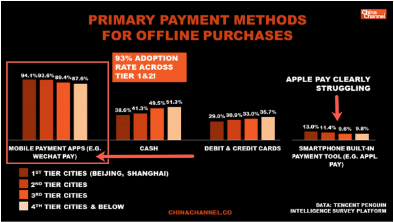
“Source: https://chinachannel.co/1017-wechat-report-users/
Statistics like this are really cool because they give a glimpse of what’s possible, of what’s coming, in the rest of the world. And when you combine that with all the capabilities of Facebook…all the rich data and targeting options hiding in our profiles…
You can see why the future of Messenger Marketing is so exciting.
The Future of Messenger Marketing
Imagine you’ve just spent a night at a hotel.
After you check out the next morning, you look at your phone and notice a notification from Facebook Messenger. You check it and see that the hotel has sent you an automated message asking, on a 1-5 scale, how your stay was.
If you respond with a 1-3, the chatbot automatically asks you if anything was wrong and what they can do to improve. If you respond by telling them about the cockroaches you found under the bed, a customer service rep immediately replies to your message and credits you with a free stay.
If you respond with a 4 or 5, the chatbot automatically thanks you and gives you a link to leave a review online. They also tell you that, in the future, you can book a room by simply sending them a message with the date and type of room you want.
Doesn’t that sound quicker, easier, and more convenient for everyone involved? (Especially compared to the nightmare of opening graphic-heavy emails and navigating a poorly designed website on your phone?) And of course, the hotel chain will be able to store the data from this conversation in a central system and use it to provide better service in the future.
In short, scenarios like this are what the future holds for Messenger Marketing.
You’ll be able to set up chatbots that automatically send a message based on the last interaction the person had with your company—whether it was watching a video, making a purchase, viewing a certain product page on your website…you name it.
When someone needs to contact you, they won’t go to your website. Instead, they’ll send you a Facebook message. Messenger will become your single point of interaction with customers—the one place where they can easily reach you anytime they have a question, need help, or simply want to make a purchase (which they will also be able to do directly through Messenger).
Messenger Is Quickly Becoming A Mainstream Channel For Businesses
Right now, Messenger Marketing is still new. Niche. Unknown to most people.
It hasn’t become a common mainstream channel of business communication and marketing.
At least…not yet. Fast-forward a year or 2 and that will all be different.
Everyone expects Messenger Marketing to continue its explosive growth. But from what we’re seeing in our own internal numbers (and we’ve got more data on this than just about everyone whose name isn’t “Facebook”), the Messenger marketing space is going to be even BIGGER than anyone expects.
Keep in mind, it’s an ideal platform for conversation.
People already use it and trust it.
And it’s got some great benefits for companies who want to keep in touch with their customers.
The awesome thing about Messenger Marketing is that it’s so incredibly versatile. When people first started testing the waters in this space, most of us thought of Messenger as an alternative to email.
But as it continues to grow and develop, companies are starting to realize just how many other roles it’s capable of filling.
It can be an alternative to a mobile app. (One your users already have downloaded.)
It can be an alternative to live chat. (One that saves each customer’s conversations no matter when or where they send you a message.)
It can be an alternative to an ecommerce store. (One with a more intuitive and conversational shopping experience.)
The truth is, it won’t be long before Messenger can become an alternative to an entire website! (This is already happening in China with WeChat.)
Soon businesses will start sending customers directly to Messenger for communication, preferring it over phone calls and email, because that’s where the customer data will be stored. And because Messenger marketing makes it so easy to follow up with the people who have chatted with you, it will help improve closing rates and provide better customer service.
For instance, consider this scenario:
A company adds a Messenger widget to their website, which allows website visitors to start a Messenger conversation with the company right there on the site (without actually visiting Messenger.)
(This is possible right now, BTW.)
The customer asks a question about a certain product and has a quick conversation. They end up leaving the site without making a purchase.
But because that person has now been added to the company’s Messenger list, that company can send them automated follow-up messages to tell them more about the product they were interested in.
A week later, that person opens one of those messages. They’re on their phone, inside the Messenger app. And they decide that yes, they do want to buy that product after all.
So they make the purchase right then & there, inside of Messenger, without having to go back to the website at all.
Now think about how that interaction unfolded.
For starters, there was no going back and forth between websites and emails and back to websites. Nope, the entire thing took place inside of one single Messenger chat that can be easily accessed at any time.
Do you see how easy, how natural that process was for everyone involved? Not just the customer but the company, too!
That’s part of the power of Messenger marketing. And that’s coming our way, guys. It’s coming faster than almost anyone realizes.
Messenger Marketing Will Move Toward More Interactive Experiences
When Messenger Marketing first arrived, people saw it as just another channel for connecting with their audience.
And they used it the same way they were using email marketing: as a way to collect subscribers and send out marketing-related broadcasts.
We saw a lot of that in 2017—a lot of one-way broadcast messages. They weren’t interactive; they were just like a typical email. “Here’s some information,” “Here’s a blog post,” “Here’s a link to my product.”
That’s OK. There’s nothing wrong with that.
But Messenger Marketing has the potential to do so much more. To be so much more powerful.
And to achieve the true potential here, you have to learn how to take advantage of Messenger marketing’s more powerful features. By building more holistic, comprehensive, and interactive messages.
In fact, at a certain point, it doesn’t really make sense to call them messages anymore. We’ll start calling them conversations, or even experiences, to reflect the interactive nature these chatbots will create.
And I expect we’ll start to see a lot more of that in 2018.
Early Adopters Will Win Big
There’s another thing I want to impress on you:
The BEST time to invest in Messenger Marketing and jump on this wave before it hits its crest is right now.
I’ve already said it a dozen different ways in this post: Messenger marketing is in the beginning stages of an explosion. And it won’t be long before it’s become a huge mainstream channel of communication.
Just think—if you could go back in time 10 years and begin investing in email marketing and building a list of email subscribers BEFORE email became overly saturated the way it is today…how valuable would that have been to you over the past decade?
Well, that time for Messenger Marketing is NOW.
If you get started with Messenger Marketing now — learning the system, developing a strategy, and building your platform and your audience — then you will be light-years ahead of your competitors in a couple years when this channel goes mainstream.
You’ll be among the leaders in your space.
But if you don’t…if you wait 3-5 years…if you wait until Messenger Marketing is so huge that you have no choice but to get in on it…
Then it will be too late. You’ll be playing catch-up and struggling to stand out from the sea of competitors who have already established a presence on Messenger.
So trust me guys…don’t wait on this. The time to strike is now.
(Keep in mind, you don’t spend any money to do this. You can get started with a free account in ManyChat and still have access to enough features to build a really sophisticated and effective chatbot without spending a penny.)
What Does 2019 Hold for ManyChat?
Up until now, I’ve been speaking about Messenger Marketing in general. And the future of this new technology is very, very bright.
But what about ManyChat specifically?
Well, we’re psyched to be working right alongside Facebook every week to help decide the future of Messenger Marketing. It’s awesome to be on the cutting edge of where this exciting new field is going.
I don’t want to give out too many specifics right now, because things are changing rapidly. But let’s just say we have a LOT of really exciting new tools and features coming your way soon. Stay tuned for more news on the ManyChat blog in the coming months.
In general, though, you can expect more cool features. More integrations. More stability. And overall, a more powerful, mature, and easy-to-use product.
Want to Grow Your Business With Messenger Marketing?
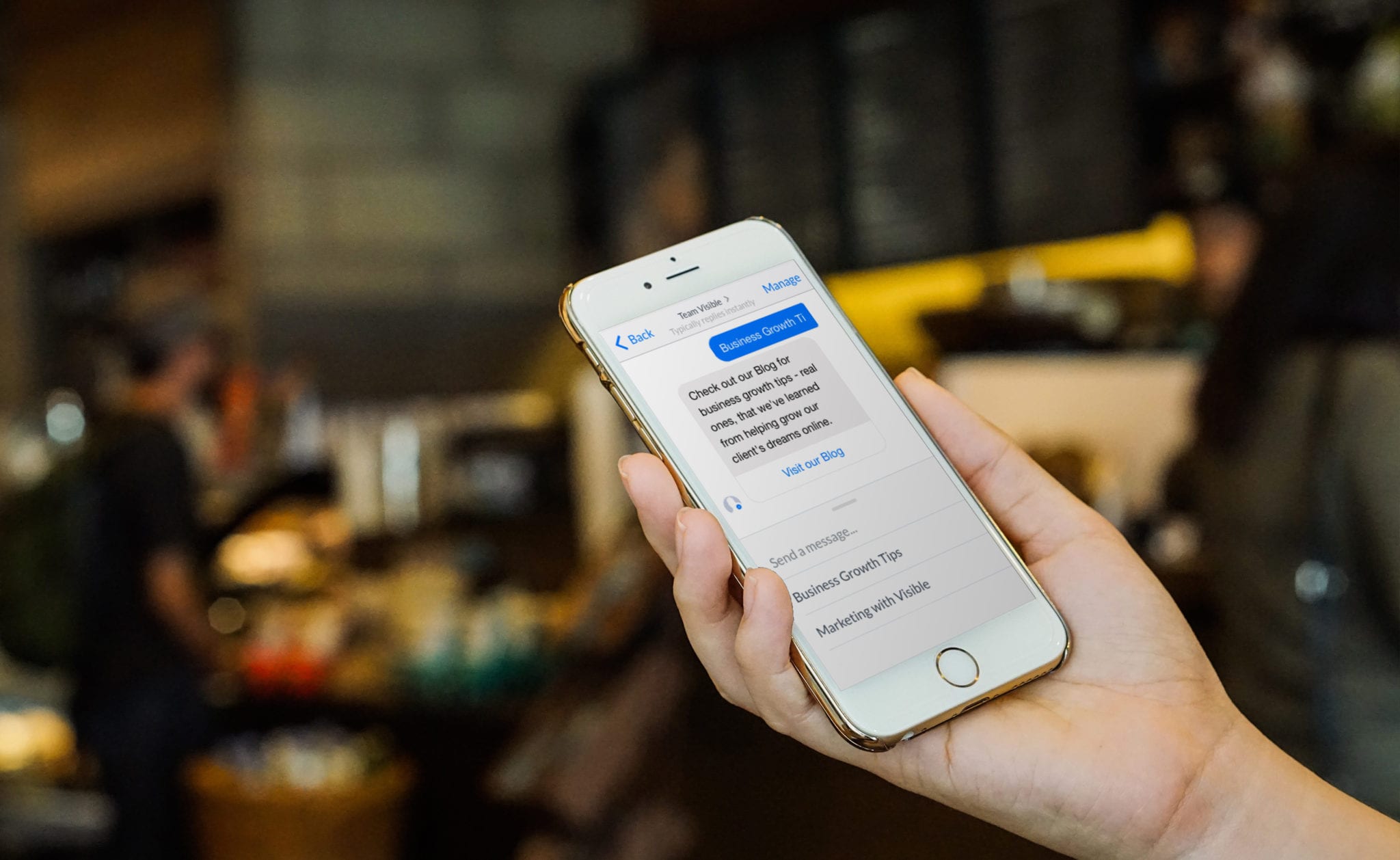
Make no mistake: Facebook Messenger Marketing is going to be a huge marketing channel for everyone—consultants, e-commerce companies, brick & mortar stores, public figures and celebrities, event organizers, and more—for the foreseeable future.
Everyone can benefit from integrating Facebook Messenger into their marketing strategy. And given how fast Messenger Marketing is growing, the sooner the better.”





